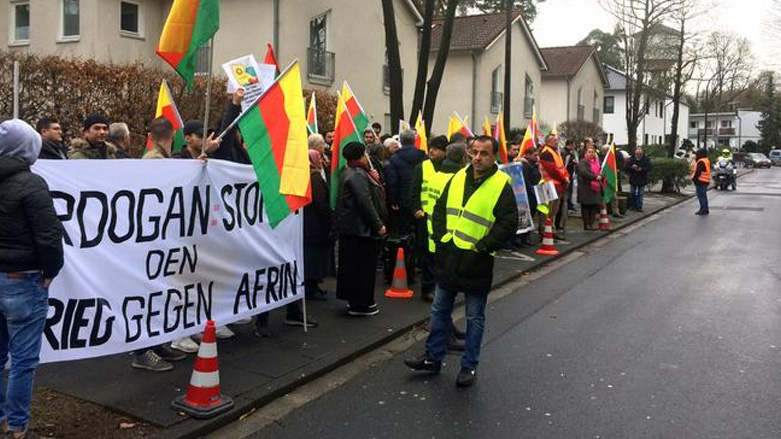German court rules Afrin protest ban as ‘unlawful’

ERBIL (Kurdistan 24) – A German court ruled on Wednesday that it was unlawful for the German police to have banned a protest against the Turkish incursion into Afrin which was scheduled to take place last February, German media reported.
On Feb. 24, 2018, a Kurdish community center in Dusseldorf planned to protest Turkey’s military incursion on Afrin, which was controlled by the People’s Protection Units (YPG).
The local police force, however, banned the protest, arguing the center was linked to the Kurdistan Workers’ Party (PKK), which is outlawed in Germany. In its ruling this week, the court decided the move by authorities to forbid the demonstration was “wrong.”
The court ruled the ban to have been a “disproportionate” response to the protest and that the authorities did not “sufficiently document the use of banned flags” used in previous demonstrations to make their case.
Turkish-backed forces occupied Afrin on March 18, 2018, and over 150,000 people from Afrin were displaced, with many living in poor conditions in camps in the Shahba region, northern Aleppo.
According to an expert report prepared for the German parliament, Turkey’s continued military presence in Syria fulfills the criteria of an occupation, Deutsche Welle reported in December.
“The Kurds are used to the German police and state suspending law when it comes to appeasing Turkey,” Dilar Dirik, a Kurdish activist and a Ph.D. student at the University of Cambridge, tweeted.
A German court ruled that it was unlawful to ban a Kurdish demo in Germany against Turkey’s invasion of Afrin last year. The Kurds are used to the German police and state suspending law when it comes to appeasing Turkey https://t.co/5YR8Usz615 via @wdr
— Dilar Dirik (@DilarDirik) February 6, 2019
In March 2017, the German Interior Ministry issued a notice to all states with the title “Update on the PKK [Kurdistan Workers’ Party] ban” and prohibited various Kurdish symbols including those of the YPG, YPJ (Women’s Protection Units), and PYD (Democratic Union Party), suggesting they were linked to the PKK.
A court in the German state of North Rhine Westphalia acquitted an activist in December from using the YPG flag.
However, activists say that German states continue to harass or prosecute their citizens for posting the YPG flag on social media or waving it during protests.
YPG spokesperson Nouri Mahmoud told Kurdistan 24 last year that some European governments are not acting “rationally” when it comes to such bans since it was the YPG that fought against the Islamic State in Syria, “in order to prevent attacks such as what happened in Paris, and could happen in Berlin, UK, or Washington.”
“Erdogan has always threatened to send jihadists to European countries [among] refugees, and ask[s] Merkel to give money from Germany and the German people. Erdogan uses this money for Syria,” he said.
He argued the international community “should stand up” to such threats and address the instability bred from plans Turkey has in northern Syria.
Editing by Nadia Riva
